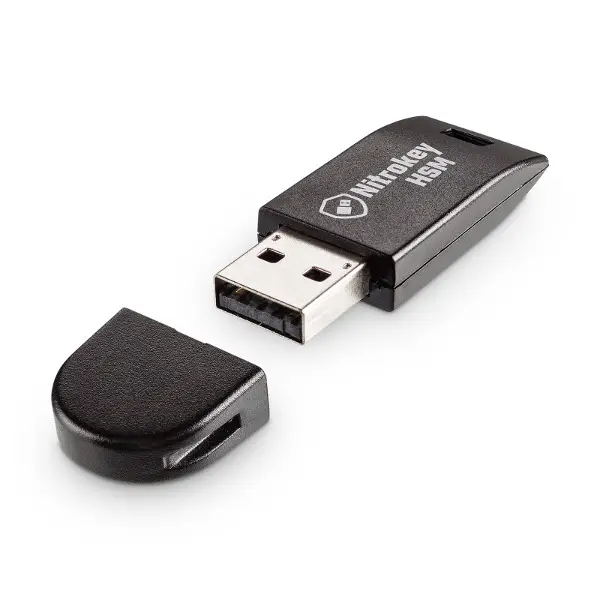Nitrokey HSM 2
Secure Key Storage With Professional Key Management
What was previously only provided by expensive and proprietary hardware security modules (HSM) is now available as open hardware at an unbeatably low price from Germany. Nitrokey HSM reliably protects your cryptographic keys with encrypted backups, two-man rule as access protection and many other security features. With a USB interface, Nitrokey HSM is the ideal solution for certificate infrastructures of any type and size.
Applications
- Operating PKI and CA
Nitrokey HSM provides secure key generation, storage and management for public key infrastructures (PKI), certificate authorities (CA) and other central signing keys. Technical security features replace expensive organizational protection measures such as storing keys in safe deposit boxes, and even protect keys for large and changing teams. - Fulfilling Compliance Requirements (e.g. PCI DSS)
According to PCI DSS, keys that encrypt or decrypt credit card data must be securely stored at all times. Nitrokey HSM is a fundamental component that helps you to meet PCI DSS requirements and to achieve your PCI DSS certification. - Internet of Things (IoT) and Protecting Your own Products
Protect your own hardware products using Nitrokey integration. Ideal for remote maintenance and for ensuring product authenticity. - Securely Administrating Servers With SSH
Protect your own hardware products using Nitrokey integration. Ideal for remote maintenance and for ensuring product authenticity. - Encrypting Emails
Your private key can be stored securely in the Nitrokey HSM for email encryption by means of S/MIME. Your keys are thus protected against loss, theft and malware.
Features
- Two-Man Rule as Access Protection / M-of-N Threshold Scheme
In order to gain access to the cryptographic keys, m of n key administrators must approve. A single person alone cannot obtain access. If an individual key administrator is unavailable, key access is still possible, provided at least m key administrators are available. This means that your keys are always protected, even in large and changing teams.
Key administrators can either authenticate themselves using their own Nitrokey HSM (required for m-of-n access protection) or by means of a password. Remote access is possible, so key administrators do not have to be physically present in the same location. - Built-in PKI Feature
The built-in PKI feature can be used to sign keys which were generated in the Nitrokey. An external entity (e.g. CA) can check the authenticity, integrity and origin of the keys. The preinstalled root certificate from our partner CardContact makes it possible to create individual and valid device certificates for each Nitrokey HSM. On request, an own root certificate can be used. A unique device ID allows cryptographic verification of the Nitrokey HSM. - Encrypted Backups
Nitrokey HSM supports key backup to protect against data loss. The backups are encrypted with the device key encryption key (DKEK). Since the DKEK can only be imported to another Nitrokey HSM, backups are always encrypted and cannot be decrypted outside of a Nitrokey HSM. - Key Restriction
Each key‘s use can be restricted (e.g. by algorithm, purpose, backup permissions). These restrictions are determined at the time of key generation and are valid for the entire life cycle of the key. This ensures compliance with allowed algorithms and with the correct cryptographic purpose. - Key Counter
A key counter allows you to count and limit the use of keys. Once defined during key generation, the key counter counts down with each key usage. As soon as the maximum number of key uses is reached, the key is locked. - Key Import
You can import existing keys onto the Nitrokey HSM: for example, for a CA key migration by converting keys from a PKCS#12 container to a suitable, importable format. Our advice: Always generate your keys in the Nitrokey HSM so that they remain protected during their entire life cycle. - Secure Channel
You can use an encrypted communication channel with the Nitrokey HSM locally or remotely (similar to SSL/TLS). Thus data exchange (e.g. PIN, signed data) and the integrity of the device commands are secured. - Transport PIN
A freely selectable transport PIN allows you to secure the device while being transported to users. The transport PIN helps the user to verify that the Nitrokey HSM has not been manipulated in transit. The user must change the transport PIN to a PIN of his own choosing before using the device for the first time. - PIN Management
Nitrokey HSM provides an initialization code (SO-PIN) for device initialization security and a user PIN for secure access. The maximum number of PIN input attempts can be configured to prevent brute force attacks. - Strong Authentication
You can use a PIN or a key to authenticate. For the latter, during the initial setup of a Nitrokey HSM, register another Nitrokey HSM key. A challenge-response procedure is used when authenticating using the Nitrokey HSM.
Supported Systems and Interfaces
- X.509, S/MIME
- PKCS#11 (Public Key Cryptography Standards)
- Cryptographic Service Provider (CSP) minidriver for Windows
- C application programming interface (API)
- Java Cryptography Extension (JCE) provider
- OpenSC and Open Smart Card Development Platform (OpenSCDP)
- CA administration software: XCA, EJBCA
- GnuPG - S/MIME version
- Windows, macOS, Linux, BSD
Technical Details
- Cryptographic algorithms: RSA, ECC, AES
- Key lengths: RSA 1024-4096 bit, ECC 192-521 bit, AES 128-256 bit
- Padding/Variants: RSAES-OAEP, RSAES-PKCS1-v1_5, RSASSA-PSS, RSASSA-PKCS1-v1_5, ECDH, ECDH with HMAC KDF, ECDSA
- Elliptic curves: SECG / NIST P-192, P-256, P-384, P-521 (secp192r1/prime192v1, secp256r1/prime256v1, secp521r1/prime521v1); Bitcoin Koblitz curve: secp192k1, secp256k1, secp521k1; RFC 5639: brainpoolP192r1, brainpoolP224r1, brainpoolP256r1, brainpoolP320r1, brainpoolP384r1, brainpoolP512r1
- Hash algorithms: SHA-1, SHA-256, SHA-384, SHA-512, internal and external hashing supported
- Storage capacity: 76 KB EEPROM total, max. 35 x ECC-521 keys, max. 55 x ECC/AES-256 keys, max. 27 x RSA-4096 keys, max. 55 x RSA-2048 keys, max. 65536 data objects
- Performance (without hashing): RSA-1024: 90 ms, RSA-1536: 150 ms, RSA-2048: 250 ms, RSA-3074: 1900 ms, RSA-4096: 4100 ms, ECDSA-256: 80 ms, ECDH-256: 90ms, ECDSA-512: 190 ms, ECDH-512: 290 ms
- Performance key generation: RSA-2048: 20 sec, RSA-4096: 120 sec, ECC-256: 6 sec, ECC-512: 8 sec
- Card Verifiable Certificates (CVC) according to BSI TR-03110 (extended access control)
- Random number generator (RNG): class DRG.3 according to AIS-20
- Encrypted backups: AES-256
- Secure messaging channel: AES-128, 3DES-112
- Life expectancy (MTBF, MTTF): > 500.000 PIN entries
- Storage time: > 25 years
- Activity indicator: monochrome LED
- Hardware interface: USB 1.1, type A
- Maximum supply current: 50 mA
- Maximum power consumption: 250 mW
- Size: 48 x 19 x 7 mm
- Weight: 6 g
- Compliance: FCC, CE, RoHS, WEEE, OSHwA

















